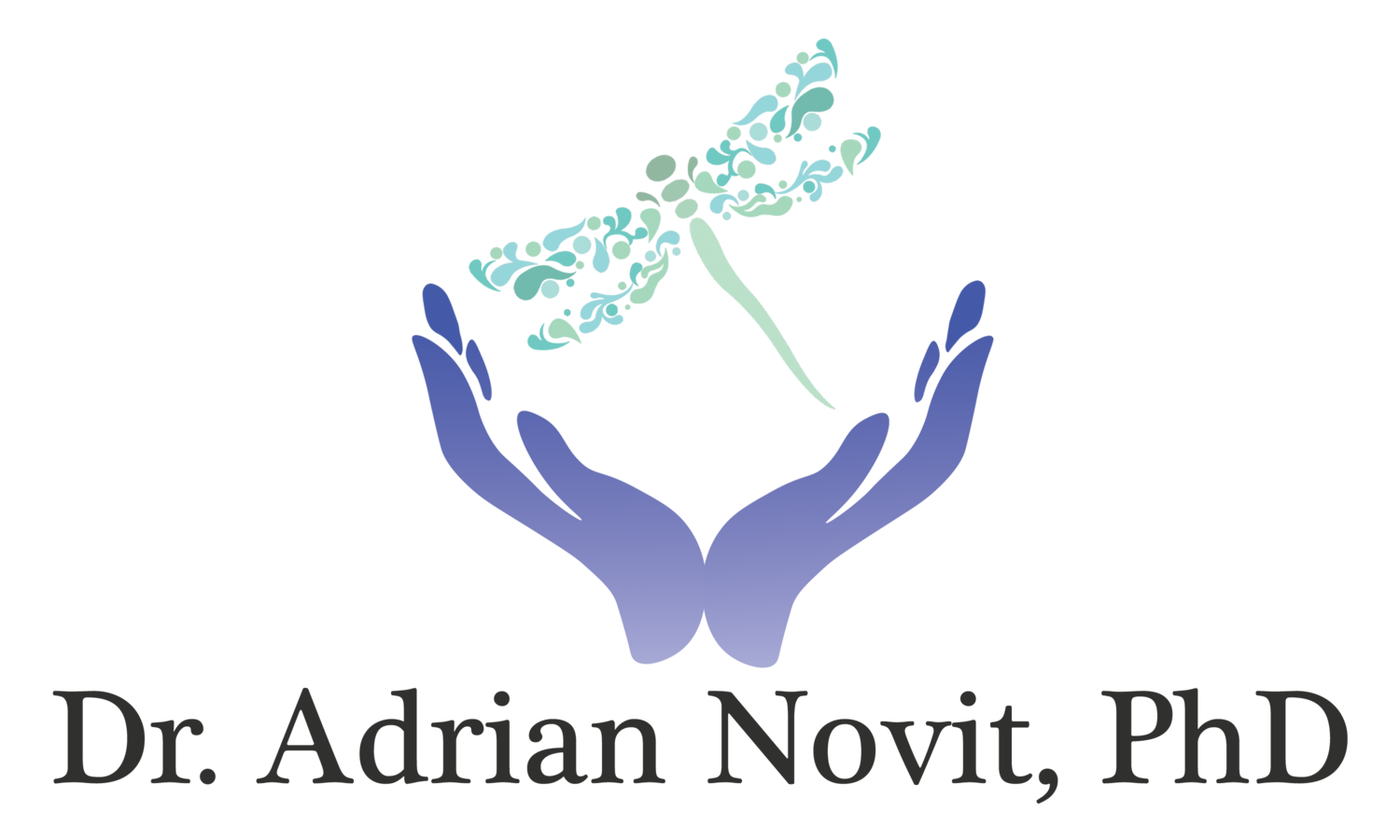Meet Dr. Adrian Novit
As a licensed clinical psychologist, Dr. Novit's practice serves teens and adults for treatment of depression, anxiety, stress, grief, attention deficits, behavioral issues, self-esteem, and other adjustment issues. She has more than 20-years of post-licensure experience providing psychotherapy and psychological assessment services to children, teens, and adults. She also has expertise in consultation, training, program management, and clinical supervision. Her experience includes working in outpatient community mental health, psychiatric inpatient, corporate, college/university, private practice, and day treatment settings.
Clinical Expertise Areas
ADHD
Adoption
Anxiety
Behavioral Issues
Depression
Grief / Loss
International Pre-Adoption Evaluations
Life Transitions
Self-Esteem
Social Skills
Stress Management
Therapeutic Approach
Dr. Novit believes that therapy is an interactive process. Her approach is strength-based, holistic, and integrative. She helps patients look at issues through a different lens to develop new perspectives and gain more clarity. Working collaboratively, she helps patients enhance their strengths and gives patients tools and support to attain positive change.
When tailoring treatment, Dr. Novit considers the patient’s background, strengths and unique life experiences, then draws from evidence-based treatment, such as mindfulness-based therapy, strength-based and solution-focused therapy, behavioral management therapy, play therapy, interpersonal therapy, psychodynamic therapy, and cognitive-behavior therapy.
My Background
Although best practice therapy is client-focused, many patients find it helpful to have some personal background information about their therapist.
Early Years
I was adopted and raised in Charleston, South Carolina. Growing up with ADHD and learning difficulties, my childhood was filled with challenges and lots of ups and downs. Teachers told my parents to focus on developing my athletic abilities and not to expect much from me academically. In school meetings, teacher comments included that I was lazy, daydreamed too much, took too long to complete assignments/didn’t complete assignments, and wasn’t motivated to work to my full potential.
Being adopted, my parents had no frame of reference with which to understand my symptoms or behaviors since no one in their family histories had ADHD or learning difficulties. Fortunately, instead of accepting teacher viewpoints, my parents chose to view me through a different, more positive lens.
My parents described me as witty, high-energy, determined, independent, compassionate, persevering, and a nonconformist — someone who marched to the beat of a different drum and usually took the road less traveled. I am grateful they trusted their gut instincts, provided me with daily structure and firm discipline, kept me active, refused to lower their bar of expectations, and gave me positive reinforcement when I deserved it and support and encouragement when I needed it.
Early Adulthood
After high-school graduation from Porter-Gaud, I wanted to explore larger cities, so I moved to New York City to attend college. I loved the “city that never sleeps” because it matched my energy level and provided me with a multitude of opportunities for exploration, cultural diversity, and adventure.
While pursuing my undergraduate degree (BA in Psychology, with a focus on Education), I took a psychology course that captured my interest and sparked my curiosity and intrigue. It’s hard to describe that “moment” when it suddenly “clicks” that you’ve found your calling. A professor recognized the “gleam in my eye” and became my mentor who inspired and motivated me to pursue graduate school and a career in psychology. I was accepted into Ferkauf Graduate School of Psychology, New York and earned a MA in Psychology with a concentration in Individual and Family Psychology.
Professional Life
Upon completion of my Master degree, I decided it was time to explore the “other” coast so I found employment as a Vocational Counselor/Outplacement Consultant/Program Supervisor in Los Angeles, California. My role included assessing marketable skills to facilitate development of career plans, providing organizational development services for downsizing/merging corporations, and managing and supervising staff in a youth employment program. This job sparked my desire to pursue a PhD. I needed to continue working to financially support myself, so I enrolled in a local program (California School of Professional Psychology) that allowed me to attend part-time. It took me longer than the average doctoral student, but despite teacher predictions, I persisted and earned my PhD in Clinical Psychology. (For clinical training and work experience details, please see my "Clinical Experience" section).
Coming Home
After many years of school, clinical training, and working in Los Angeles, I decided to return to Charleston to be with my family. I found employment at MUSC STAR Children’s Day Treatment Program. As Program Coordinator, I oversaw the clinical and administrative responsibilities of the program, which provided daily intensive, comprehensive therapeutic intervention to children and teens presenting with significant behavioral issues and severe emotional symptoms associated with psychiatric diagnoses. As Clinical Psychologist, I developed and facilitated daily therapeutic process groups focusing on stress management, anger management, social skills, family issues, and self-esteem. I also provided individual and family therapy, behavior management, crisis intervention, and psychological assessment.
Realizing I needed a better life-work balance, I left MUSC and am now in private practice providing psychotherapy to adolescents, and adults and performing international preadoption evaluations.
Community Involvement
While in New York and California, I regularly coached girls basketball teams and volunteered at numerous organizations. I also frequently participated in charity runs throughout the five boroughs of New York and throughout Los Angeles. Since moving back to Charleston, I continue being a regular at many of the charity runs. I volunteer at various organizations such as Halos, Happy Wheels and Meals on Wheels. I also regularly donate to organizations near and dear to my heart including Susan G. Komen South Carolina and Donate Life South Carolina.
Current Life - Balance
I maintain balance in my life through kayaking, running, meditation, hiking, exercising, enjoying music/sports, traveling, laughing, and spending time with family, friends, and my amazing dogs.
“One of the secrets of life is to make stepping stones out of stumbling blocks.”
Clinical Experience
As an undergraduate student in New York City, I majored in Psychology and minored in Elementary Education. I earned a Master of Arts (MA) in Psychology with a concentration in Individual and Family Psychology at Ferkauf Graduate School of Psychology, New York. I earned a Master of Arts (MA) in Clinical Psychology and a Doctorate of Psychology in Clinical Psychology (PhD) at the California School of Professional Psychology.
Numerous hours/years of supervised clinical training were required prior to earning each graduate degree and prior to being eligible to take licensing exams.
Pre-Licensure Clinical Training
Psychotherapy and Assessment for adults in a geriatric treatment center
Evaluation and Therapy for children in a medical hospital
Research: Pediatric AIDS
Play therapy and Assessment for children in a day treatment setting
Psychotherapy and Testing for adults, teens and children in an outpatient community mental health clinic
Research: Alzheimer’s/Dementia
Crisis Counselor on the National Child Abuse Hotline
Full-time American Psychological Association (APA) Accredited Internship in the residential, day treatment and child abuse departments of an outpatient community mental health clinic
Full-time Postdoctoral Fellowship at a psychiatric hospital on the adult and adolescent inpatient units
Pre-Licensure Specialty Training
Developmental Disabilities and Special Health Care Needs: UCLA Neuropsychiatric Institute. As part of this 1-year training program, I provided mental health services and assessment to patients presenting with developmental disabilities, physical challenges, neurological issues, and chronic medical illnesses.
Neuropsychological Assessment: I acquired 5-years of specialty training in Neuropsychological Assessment, working part-time as a Registered Psychological Assistant under the supervision and guidance of a Neuropsychologist in private practice. In this role, I conducted neuropsychological and psychological assessments and provided psychotherapy to children, adolescents, and adults presenting with emotional and behavioral issues, learning and developmental delays, psychiatric diagnoses, cognitive deficits, attention difficulties, and neurological trauma.
Post-Licensure
Since licensure, I have held numerous positions working in outpatient community mental health clinics, psychiatric inpatient units, corporations, colleges/universities, private practices, and day treatment settings.
Post-Licensure Positions
Program Coordinator of a children’s day treatment program
Neuropsychology/Concussion Consultant for the National Hockey League: LA Kings
Interim Training Director of an APA accredited clinical psychology internship program
Program Coordinator of a learning and attention disorders clinic in an outpatient community mental health setting
Primary Attending/Director of Psychology Training of adolescent and adult units in a psychiatric inpatient hospital
Clinical Psychologist in day treatment programs, outpatient community mental health clinics, psychiatric inpatient units, and private practices
Researcher/Principal Investigator on various studies/projects
College and University Faculty positions
Clinical Supervisor of staff, interns, fellows, and medical residents in outpatient community mental health clinics, day treatment programs, private corporations, and psychiatric inpatient units
Psychological Assessment Consultant for clinical staff, licensed/unlicensed clinical psychologists, interns/fellows/residents, and other professionals at psychiatric hospitals, outpatient clinics, and university community counseling centers
Continuing Education/In-Service Training Instructor on topics such as ADHD, Clinical Supervision, Adoption, Cultural Proficiency, Assessment, Stress Management, and Behavioral Management
“A river cuts through rock, not because of its power, but because of its persistence.”
What I've Learned
The path I chose has been rocky with obstacles, challenges, and sacrifices every step of the way. But these experiences have influenced my career path and unique therapeutic style and have made me a better psychologist with a deeper understanding of and compassion for my patients.
Through my own journey of self-discovery with various mental health professionals, I have gained an understanding of and appreciation for my parents’ firm structure and expectation of me to work harder and not quit despite my frustrations, rebellion and frequent complaints. And each time I stumble and fall, I stand up, dust off my knees, and figure out what I can learn from the experience in order to keep moving forward. I have come to embrace being diagnosed with ADHD and learning difficulties because it’s part of what has made me the person I am today. And, although I continue to experience challenges, I’ve discovered it’s not a sign of weakness to ask for help. In fact, the opposite is true - Recognizing the need for help and seeking it actually require significant amounts of strength, courage and determination to succeed.
Lessons from my Parents
My parents taught me to focus on my strengths and motivated me to use those strengths to help compensate my weaknesses.
They also taught me
how to access/effectively use my resourcefulness and resilience
how to step back and look at issues through a different lens
how to turn challenges, obstacles, and mistakes into learning experiences
how to use my sense-of-humor and wit productively and constructively
the benefits of mindfulness/being in the present moment
the benefits of optimism
the benefits of thinking outside the box
the importance of deep breathing, exercising, and progressive muscle relaxation
the importance of having balance in my life
the importance of a support network and accepting help
and most importantly, to accept myself for who I am - my imperfections, eccentricities, natural talents, and strengths




